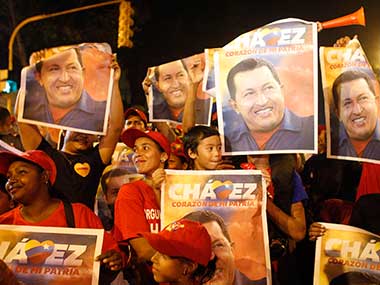If Indian politicians across the spectrum need lessons on the folly of fusing rampant cronyism with bleeding-heart socialism that channels national assets into high-minded but entirely unproductive social spending, they will find plenty of it in deceased Venezuelan President Hugo Chavez’s economic legacy.
Just as Indian leaders, from the days of Indira Gandhi down to Sonia Gandhi, have made a virtue of their pro-poor leanings, and legitimated them through populist economic postures while simultaneously overseeing the plunder of national resources by the privileged few, Chavez was the ultimate socialist democrat who focussed excessively on redistribution of wealth but simultaneously allowed “Boligarchs” close to him to flourish.
In Chavez’s case, his lavish social spending, which made him enormously popular with the poor (from whose ranks he rose), was underwritten by Venezuela’s oil wealth during a period of global economic boom and excess liquidity, which saw oil prices soar for much of his term. India’s bleeding heart socialists, on the other hand, have been looking to build a First World social welfare infrastructure on a decidedly Third World economy, using borrowed money.
[caption id=“attachment_650380” align=“alignleft” width=“380”]
 Reuters[/caption]
Reuters[/caption]
Developing economies, of course, have to provide for the poor. And in Venezuela’s case, the terms of the oil trade in an earlier times were heavily weighted in favour of multinational oil companies that expropriated much of the profits. To that extent, Chavez’s philosophy of putting Venezuela’s poor at the centre of the economic discourse and getting them to benefit from its oil wealth was entirely legitimate.
But it needs more than good intentions to do the right thing, and on that count, for all the goodwill that Chavez generated with the poor by his waves of nationalisation and public spending, he also oversaw the downslide of Venezuela’s economic competitiveness and pretty much ran it to the ground.
Impact Shorts
More ShortsAs Moises Naim, a former Venezuelan Minister of Trade and Industry, observes ( here ), Venezuela today has one of the world’s largest fiscal deficits, highest inflation rates, worst misalignment of the exchange rate, fastest-growing debt, and one of the most precipitous drops in productive capacity, including in the oil sector. During the Chavez era, he writes, Venezuela fell to the bottom of the rankings that measure international competitiveness, ease of doing business, or attractiveness to foreign investors, while rising to the top of the list of the world’s most corrupt countries. A new oligarchy of allies of the Chavez regime’s leaders and their families have amassed enormous wealth through corrupt deals with the government.
Having proved spectacularly ill-equipped to grow the economic pie, Chavez dragged down everyone to the lowest common denominator of socialism by expropriating private property - and allowing shopping malls to be converted into “ skyscraper slums ”.
It is in this area that the parallels in India acquire greater resonance. Much like Chavez did, the UPA government has bought itself popularity on the cheap by spending money on grandiose projects in the name of the poor, but where the delivery mechanism is so flawed as to render the spending wasteful.
Virtually every one of the big-ticket spending binges of the UPA government - in the name of the poor - leaks like a sieve: from the farmers’ debt waiver (in which the CAG pointed to irregularities on Tuesday) to the NREGA rural employment guarantee scheme ( which is actually killing jobs )to the Food Security Bill (which, as Firstpost established , is a flawed - and enormously expensive - way of addressing food security for India’s poor), spending borrowed money is the surest path to economic ruin.
All of them reflect the error of building social safety nets - however well-intentioned they may be - without adequate consideration of their economic sustainability or the outcomes. It is this that has pushed the Indian economy so perilously close to the edge, requiring Finance Minister P Chidambaram to cut back spending at precisely the point of the economic cycle when GDP growth is at its slowest in a decade.
Simultaneously, for a government that claims to protect the interests of the poor, it has been overseen another profligacy in the plunder of national resources and assets - from telecom spectrum to coal blocks to land - by the privileged few.
The problem with socialist demagoguery of the sorts that Chavez exploited adroitly- and which politicians nearer home too are looking to emulate - is that it triggers off competitive populism. Virtually no political party has shown itself capable of rising above populist giveaways, even though governments at both the Centre and in the States are fiscally constrained, with huge piles of debt.
Hugo Chavez was a colourful politician who harnessed Venezuela’s national assets in the cause entitlements for the poor but without enhancing their capabilities. His economic legacy is at best mixed: as Naim observed, he empowered the poor but gutted Venezuela.
The greater worry is that Chavez’s socialist worldview resonates among so many of India’s socialist democrats who count as the heirs of his economic philosophy - from Sonia Gandhi to Arvind Kejriwal to Mamata Banerjee to the Left leaders. And, worse, India doesn’t have the petrodollar blank cheque that Chavez did. That way lies only economic ruin - and it would have come about in the name of doing good to the poor.
Venky Vembu attained his first Fifteen Minutes of Fame in 1984, on the threshold of his career, when paparazzi pictures of him with Maneka Gandhi were splashed in the world media under the mischievous tag ‘International Affairs’. But that’s a story he’s saving up for his memoirs… Over 25 years, Venky worked in The Indian Express, Frontline newsmagazine, Outlook Money and DNA, before joining FirstPost ahead of its launch. Additionally, he has been published, at various times, in, among other publications, The Times of India, Hindustan Times, Outlook, and Outlook Traveller.
)